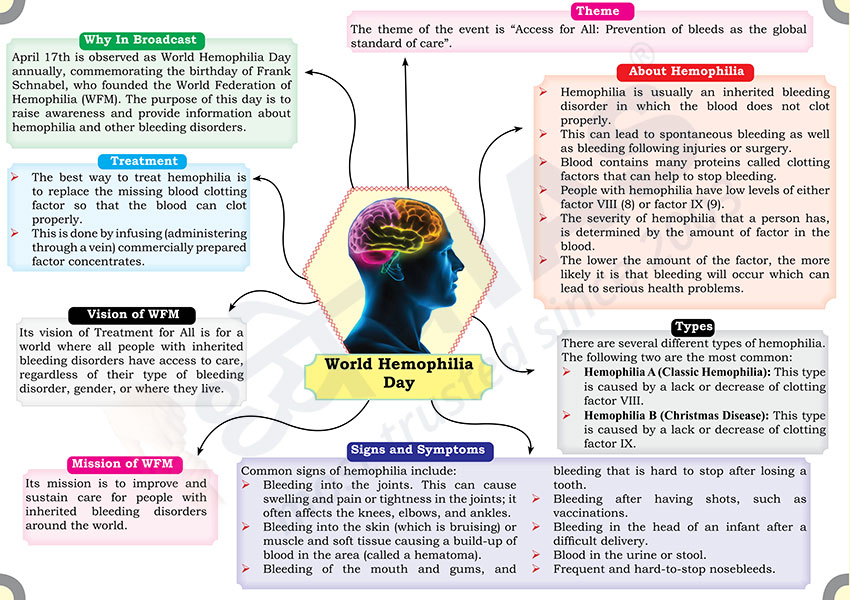Daily-current-affairs /
08 May 2023
Brain Booster for UPSC & State PCS Examination (Topic: World Hemophilia Day)

Why in Broadcast?
- April 17th is observed as World Hemophilia Day annually, commemorating
the birthday of Frank Schnabel, who founded the World Federation of
Hemophilia (WFM). The purpose of this day is to raise awareness and provide
information about hemophilia and other bleeding disorders.
Theme
- The theme of the event is “Access for All: Prevention of bleeds as the
global standard of care”.
About Hemophilia
- Hemophilia is usually an inherited bleeding disorder in which the blood
does not clot properly.
- This can lead to spontaneous bleeding as well as bleeding following
injuries or surgery.
- Blood contains many proteins called clotting factors that can help to
stop bleeding.
- People with hemophilia have low levels of either factor VIII (8) or
factor IX (9).
- The severity of hemophilia that a person has, is determined by the
amount of factor in the blood.
- The lower the amount of the factor, the more likely it is that bleeding
will occur which can lead to serious health problems.
Types
- There are several different types of hemophilia. The following two are
the most common:
- Hemophilia A (Classic Hemophilia): This type is caused by a
lack or decrease of clotting factor VIII.
- Hemophilia B (Christmas Disease): This type is caused by a
lack or decrease of clotting factor IX.
Signs and Symptoms
Common signs of hemophilia include:
- Bleeding into the joints. This can cause swelling and pain or tightness
in the joints; it often affects the knees, elbows, and ankles.
- Bleeding into the skin (which is bruising) or muscle and soft tissue
causing a build-up of blood in the area (called a hematoma).
- Bleeding of the mouth and gums, and bleeding that is hard to stop after
losing a tooth.
- Bleeding after having shots, such as vaccinations.
- Bleeding in the head of an infant after a difficult delivery.
- Blood in the urine or stool.
- Frequent and hard-to-stop nosebleeds.
Mission of WFM
- Its mission is to improve and sustain care for people with inherited
bleeding disorders around the world.
Vision of WFM
- Its vision of Treatment for All is for a world where all people with
inherited bleeding disorders have access to care, regardless of their type
of bleeding disorder, gender, or where they live.
Treatment
- The best way to treat hemophilia is to replace the missing blood
clotting factor so that the blood can clot properly.
- This is done by infusing (administering through a vein) commercially
prepared factor concentrates.
























